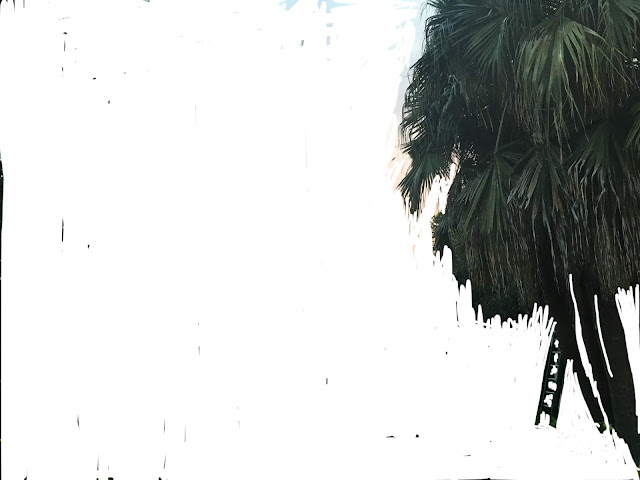Sunday morning I had the feeling that everything was crushed up against something else. When I texted a friend asking if he had read some book, he replied that he was salivating at the idea of silence in the house where he could read for an hour not having had that in a “long long long time.” I responded that I was fantasizing about whitespace. I wanted to wrap myself in whitespace. I wanted to install whitespace around each thought, action, and obligation. The whitespace would be made of physical space, silence, and time. I drew a bullet point in the middle of a big, blank text message. He asked me to explain.
 |
| Student Work |
These days, it’s as if nothing has negative space around it. One thing (one responsibility, email to answer, thing to order) overlaps another. Therefore, it is hard to see the shape of things.
I like reading books with lots of whitespace.
The White Cube is a term describing a certain art gallery aesthetic. The white
cube is whitespace in cubic feet. I like the white
cube. I like the controlled context, the
minimizing of distractions, and the implied assertion that what you see in here attempts to address the notion
that things have meaning.
I would like to put everything in my life in its own white cube, not only the painting I am working on, but the Entergy bill, my broken car window, my son’s socks on the floor. Then maybe I could see what they all mean.
And people, everyone to whom I owe a phone call or an hour, I’d like to put them in—or more politely, invite them to—a white cube gallery. I could go and see them in the near-void. Maybe it would be like Marina Abramović’s The Artist is Present without all of those museum-goers watching. (Meet me at the white cube at 4 o’clock. I will see you—like really see you—there.)
I would like to put everything in my life in its own white cube, not only the painting I am working on, but the Entergy bill, my broken car window, my son’s socks on the floor. Then maybe I could see what they all mean.
And people, everyone to whom I owe a phone call or an hour, I’d like to put them in—or more politely, invite them to—a white cube gallery. I could go and see them in the near-void. Maybe it would be like Marina Abramović’s The Artist is Present without all of those museum-goers watching. (Meet me at the white cube at 4 o’clock. I will see you—like really see you—there.)

All day Monday I thought about whitespace.
I turned off NPR to try to hear the whitespace.
I imagined my sons surrounded by it as they walked into school.
I took a photo of my yard and whitewashed everything but the ladder to the shed roof (roofs are great for finding whitespace) and the palm trees.
And last night I looked in my art books for whitespace (Toba Khedoori, Rachel Whiteread, Michael Landy...).
 |
| My Books |
This morning, it occurred to me that whole breath thing with yoga might be about creating internal whitespace.
e.e. cummings knew a thing or two about whitespace.
I guess this is not new to me. As I was writing I remembered a painting I made in grad school that was about ten feet wide and four feet tall. It was all white except for on one side a silhouette of a man and on the other a silhouette of a dog. I found other images of old work that also prove this is not the first time I have thought about or engaged in whitewashing, if that is what it is.
 |
| Untitled, In-Progress Grad School Painting |
If I could have a
superpower right now, this would be it:
to make space where there isn’t enough space,
quiet where there isn’t enough quiet,
and time with nothing in it where there is no time with nothing in it.
to make space where there isn’t enough space,
quiet where there isn’t enough quiet,
and time with nothing in it where there is no time with nothing in it.
I am more human than super. And like almost everyone I know, I am overwhelmed.
But after thinking about whitespace I am committed to try to find more whitespace,
to profit from nothingness,
and maybe where I can't find space, time, or silence, try to create it.
 |
| Yard With Whitespace |
 |
| Untitled (People on a Beach in California) Acetone Print With Graphite and Colored Pencil |




